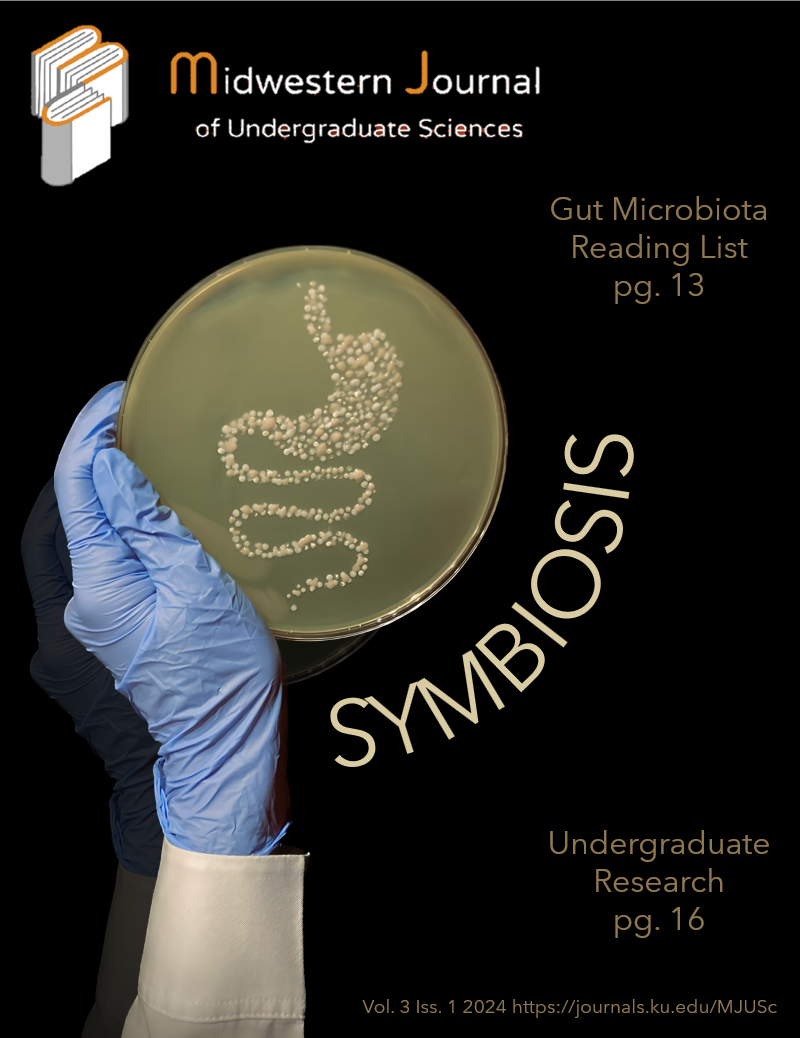Short-Chain Fatty Acids
A Potential Therapy for Colorectal Cancer
DOI:
https://doi.org/10.17161/mjusc.v3i1.22859Keywords:
colon, cancer, SCFA, microbiome, gut microbiotaAbstract
Short-chain fatty acids (SCFAs), primarily acetate, propionate, and butyrate, have garnered significant attention due to their anti-inflammatory properties within the human body.1 Expanding on these studies, recent research has revealed that SCFAs exhibit selective antitumor effects on colorectal cancer cells (CRC cells). The findings from these investigations have illuminated the influence SCFAs can have on the development and progression of colorectal cancer. These discoveries underscore the therapeutic potential SCFAs might offer in the management and treatment of colorectal cancer.
References
Kelly, C. J., Zheng, L., Campbell, E. L., Saeedi, B., Scholz, C. C., Bayless, A. J., Wilson, K. E., Glover, L. E., Kominsky, D. J., Magnuson, A., Weir, T. L., Ehrentraut, S. F., Pickel, C., Kuhn, K. A., Lanis, J. M., Nguyen, V., Taylor, C. T., & Colgan, S. P. (2015). Crosstalk between microbiota-derived shortchain fatty acids and intestinal epithelial HIF augments tissue barrier function. Cell Host & Microbe, 17(5), 662–671.https://doi. org/10.1016/j.chom.2015.03.005
Scheppach, W, et al. “Role of short-chain fatty acids in the prevention of colorectal cancer.” European Journal of Cancer, vol. 31,no. 7–8, July 1995, pp. 1077–1080, https:// doi.org/10.1016/0959-8049(95)00165-f.
Gomes, Sara, et al. “Microbiota-Derived Short-Chain Fatty Acids: New Road in Colorectal Cancer Therapy.” MDPI, Multidisciplinary Digital Publishing Institute, 1 Nov. 2022, www.mdpi.com/1999- 4923/14/11/2359.
Zuo, Li, et al. “Butyrate suppresses proliferation and migration of RKO colon cancer cells through regulating endocan expression by MAPK signaling pathway.” Food and Chemical Toxicology, vol. 62, Dec. 2013, pp. 892–900, https://doi.org/10.1016/j. fct.2013.10.028.
Ryu, Tae Young, et al. “Human gut-microbiome- derived propionate coordinates proteasomal degradation via HECTD2 upregulation to target EHMT2 in colorectal cancer.” The ISME Journal, vol. 16, no. 5,
Jan. 2022, pp. 1205–1221, https://doi. org/10.1038/s41396-021-01119-1.
Sahuri-Arisoylu, Meliz, et al. “Acetate induces growth arrest in colon cancer cells through modulation of mitochondrial function.” Frontiers in Nutrition, vol. 8, 15 Apr. 2021, https://doi.org/10.3389/ fnut.2021.588466.
Halaby, Reginald. “Natural products induce lysosomal membrane permeabilization as an anticancer strategy.” Medicines, vol.
, no. 11, 10 Nov. 2021, p. 69, https://doi. org/10.3390/medicines8110069.
Li, Q., Ding, C., Meng, T., Lu, W., Liu, W., Hao, H., & Cao, L. (2017). Butyrate suppresses the motility of colorectal cancer cells via deactivating Akt/ERK signaling in histone deacetylase dependent manner. Journal of Pharmacological Sciences, 135(4), 148–155. https://doi.org/10.1016/j. jphs.2017.11.004
Downloads
Published
Issue
Section
License
Copyright (c) 2024 Samia Chergui, Jack Treml

This work is licensed under a Creative Commons Attribution-NonCommercial 4.0 International License.
© The Author(s)
This work is licensed under a Creative Commons Attribution-NonCommercial 4.0 International license.

